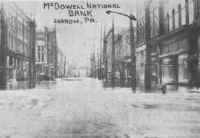| Sharon | |||||||||||||||||||||||||||
Sharon's Yesterdays & Tomorrow An Outline of the Growth of Sharon and its Industries.... and a History of the McDowell National Bank, June 1935
|
|||||||||||||||||||||||||||
|
|
Sharon's Industrial History
The Sharon District seems to be in another
period of transition. Continuous mills have made obsolete some of the old
methods of manufacturing, and the Shenango Valley is no longer the center
of production of flat-rolled steel. This center has moved to Detroit.
Water transportation has taken heavy industry to locations on water. But,
if the situation is properly dealt with, there is much to look forward to. In the two decades before 1887 the iron industry
assumed vast proportions compared with previous production, and a
beginning was made in the manufacture of rolled and finished material.
Statistics for the year 1887 are interesting for purposes of comparison.
Pig iron tonnage was 279,236; rolled iron was 47,519; there were 66,625
hundred-pound kegs of iron nails produced. Mercer County boasted of 17
blast furnaces, six rolling mills and an open-hearth steel casting plant. Through the two decades after 1887 there was an
even greater ratio of increase. In 1906 the production of pig iron in
Mercer County amounted to 1,208,294 tons. This was nearly 11 per cent of
the total produced in the State. Among the counties in Pennsylvania,
Mercer County was second in the production of pig iron, Allegheny County
being first. Steel manufacture in the Valley was limited in
1906. There were 815,913 tons produced here. This was seven per cent of
the total in the State. This county ranked third among counties. In the
same year 676,261 tons of rolled steel were produced. Mercer County ranked
second in rolled iron and steel in that year. The Sharon Steel Castings Company was organized
in 1887 and was the first steel plant in the Sharon District. Its
equipment consisted of an open hearth furnace, and the first steel seas
made there on August 26, 1887. The organizers of the company were F. H.
Buhl, Daniel Eagan and Samuel McClure. Mr. Buhl was president; Mr.
McClure, Vice president; and Mr. Eagan, secretary and general manager. The
plant was acquired by the American Steel Castings Company, which in 1902
became a constituent company of the American Steel Foundries. The Mercer
Tube plant now occupies the site. The Sharon Steel Hoop Company was organized in
1900, amid the plant was put in operation on March 15, 1901.
The original officers of the company were: Morris Bachman,
president; O.
A. Blackburn, vice president; R. A. Winterburn, secretary’; and
E. J.
Anglin, treasurer. The company originally produced billets, sheet bars,
hoops, bands and cotton ties. The Sharon Steel Works and Furnace, which was
known until recent years as the North Works of the Carnegie Steel Company,
was founded in 1896 by the Buhl Steel Company, the president of which was
F. H. Buhl. The open hearth was put into operation in May, 1897. The
blooming mill started soon after. The Buhl Steel Company was absorbed by
the National Steel Company in March, 1899, and was one of the numerous
plants of the steel corporation until dismantled in 1921 and 1922. The
blast furnace was dismantled in 1925 and 1926. Mr. Buhl was also one of the active factors in
the founding of what is now the Carnegie Steel Company plant in Farrell.
The history of what was then South Sharon began practically with the
building of the mill, which was started in February, 1900. In 1902 time
plant was taken over by the U. S. Steel Corporation. The American Sheet & Tin Plate Company and
the American Steel & Wire Company were erected to absorb the output of
the company’s local steel plants. They were built at practically the
same time as the Carnegie Mill. The period of the World War brought a great boom
to industry in the Sharon District. Following this period, in 1923, the Westinghouse
Electric and Manufacturing Company purchased the plant of the Savage
Arms Corporation in Sharpsville Avenue. The plant had been originally
the
Driggs-Seabury Corporation. The Westinghouse Company made extensive
additions and improvements to the plant. Included in its buildings is
the largest one-story building in the world. The plant is used exclusively for the production
of transformers for the Westinghouse Company. The coming of the
Westinghouse Company to Sharon was an important factor in the city’s
progress. Today the Sharon District numbers some thirty
important industries and is an ideal location for practically any kind of
new enterprise. Its present industries are: Westinghouse
Electric and Manufacturing Company, Sharon Steel Hoop Company, Carnegie
Steel Company, American Sheet and Tin Plate Company, American Steel and
Wire Company, Claire Furnace, Shenango Furnace, Sharpsville Boiler Works,
Keystone Machine Company, Pennsylvania Tank Car Company, Mercer Tube
Company. Sharon Tube Company, Petroleum Iron Works Company, Sharon
Hardware Company, National Malleable & Steel Castings Company, Air
Reduction Sales Company, Pittsburgh Steel Foundries, Standard Tank Car
Company, Sharpsville Furnace, Shenango Penn-Mould Company, Standard Slag
Company, The Tennis Company, Sharon Railway Supply Company,
Wheatland Tube Company, Valley Mould & Iron Company, Valley Cities
Brick Company, Shenango Valley Water Company, Sandow & Goldberg
Scrap Companies, P-O Electric Car Shops, and Rotter-Spear Company. |
State Street Flood 1913
Driggs-Seabury Corporation,
Sharon Steel Hoops, 1906
Related information on:
|
|||||||||||||||||||||||||



